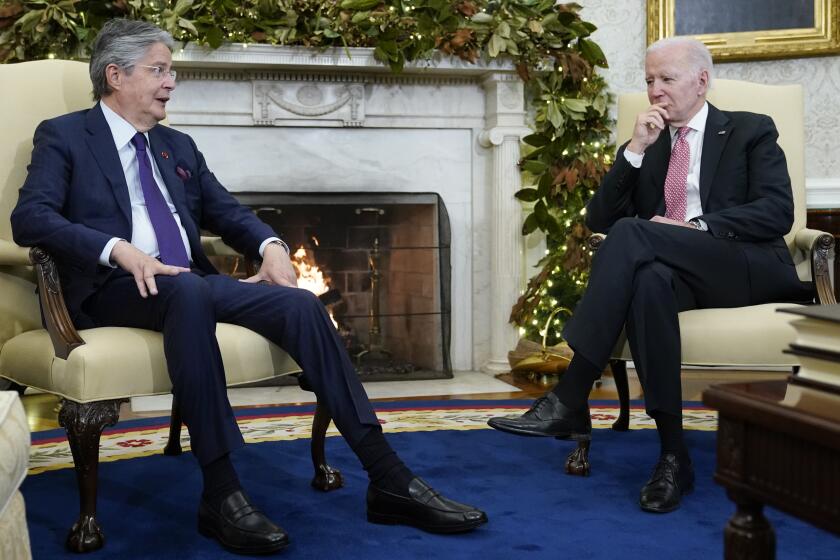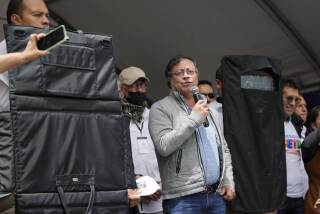Ecuador’s president dissolves National Assembly, ending impeachment proceedings

- Share via
QUITO, Ecuador — Ecuadorean President Guillermo Lasso on Wednesday put an end to impeachment proceedings against him by dissolving the opposition-led National Assembly, which had accused him of embezzlement.
The conservative president, who has denied any wrongdoing, can govern for up to six months by decree under a constitutional provision that had not previously been used, and his move swiftly drew criticism from many who said his removal from office had been imminent.
Soon after Lasso’s announcement, the South American country’s top military leader warned that the armed forces would act “firmly” if any violence erupts. A strong contingent of military and police officers blocked access around the National Assembly building in Ecuador’s capital, Quito.
In a televised message, Lasso accused the National Assembly of focusing “on destabilizing the government.” He called his move “democratic” and described it as a way to give “people the power to decide their future in the next elections.”
Lawmakers had accused Lasso of not having intervened to end a contract between the state-owned oil transport company Flota Petrolera Ecuatoriana and the private entity Amazonas Tankers. The accusers argue that Lasso knew the contract was full of irregularities and would cost the state millions in losses, something that the president rejects as untrue.
The National Electoral Council now has seven days to call presidential and legislative elections, which must be held within 90 days. Those elected will finish the terms of Lasso and the lawmakers he ousted, which had been set to end in May 2025. Lasso can choose to run in the election.
Biden administration efforts to find a partner in Latin America ignore Ecuador’s severe problems, congressional critics say.
Lasso, a former banker, was elected in 2021 and has clashed from the start with a strong opposition in the 137-member National Assembly. He defended himself before congress on Tuesday, insisting there was no proof or testimony of wrongdoing.
After Lasso announced his decision Wednesday, the head of the Joint Command of the Armed Forces, Gen. Nelson Proaño, called on Ecuadoreans to maintain respect for the law and warned against rupturing the constitutional order through violence.
If violence erupts, the armed forces and police “will act firmly,” he said.
Lasso’s move quickly led to criticism from the powerful Confederation of Indigenous Nationalities, which in recent years has carried out protests that have virtually paralyzed the country. Its leader, Leonidas Iza Salazar, said Lasso “launched a cowardly self-coup with the help of the police and the armed forces, without citizen support,” as he faced “imminent dismissal.”
Brazil’s former President Jair Bolsonaro is facing questions as part of an investigation into alleged falsification of COVID-19 vaccine cards.
Will Freeman, fellow for Latin American studies at the Council on Foreign Relations, said Lasso’s decision signaled that “he was aware the opposition had enough votes to impeach him, and maybe then some.” He said mass protests were likely in the coming days.
“It’s also hard to imagine Lasso is making this move without the tacit support of top brass in the military,” he said. “In the past, protests have tended to turn destructive quickly — and security forces have also cracked down.”
In dissolving the assembly, Lasso made the first-ever use of the Ecuadorean presidency’s “nuclear” option in conflicts with the legislative branch. Known colloquially as the “death cross,” the option to disband and temporarily rule by decree was established in the constitution in 2008.
The measure is aimed at preventing protracted periods of political paralysis, Ecuadorean legal analyst Ramiro Aguilar said.
“A conflict of this nature can last four years, and it is a conflict that paralyzes the country,” he said.
News Alerts
Get breaking news, investigations, analysis and more signature journalism from the Los Angeles Times in your inbox.
You may occasionally receive promotional content from the Los Angeles Times.
Meanwhile, the country loses democratic debate during the interim.
“There will be a unilateral voice of the executive branch imposing a course without the counterweight of the assembly, and the country loses credibility because it is left with a weak institutional framework,” Aguilar said.
More to Read
Sign up for Essential California
The most important California stories and recommendations in your inbox every morning.
You may occasionally receive promotional content from the Los Angeles Times.












